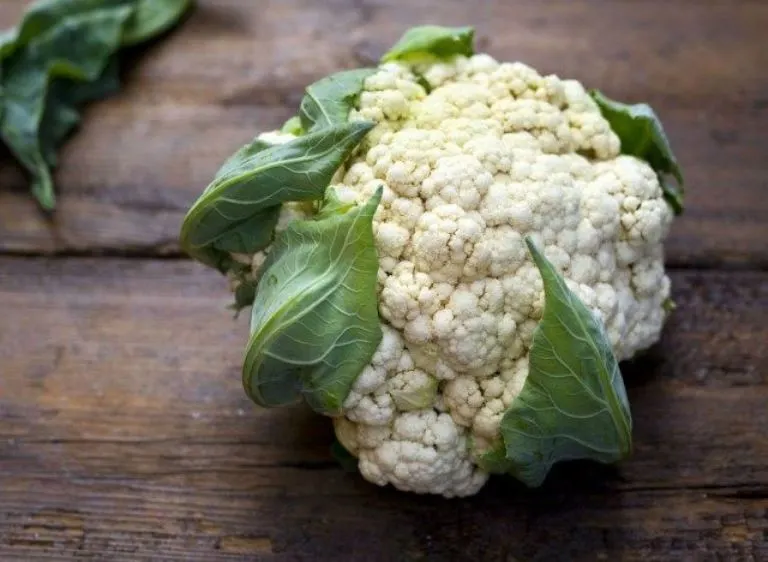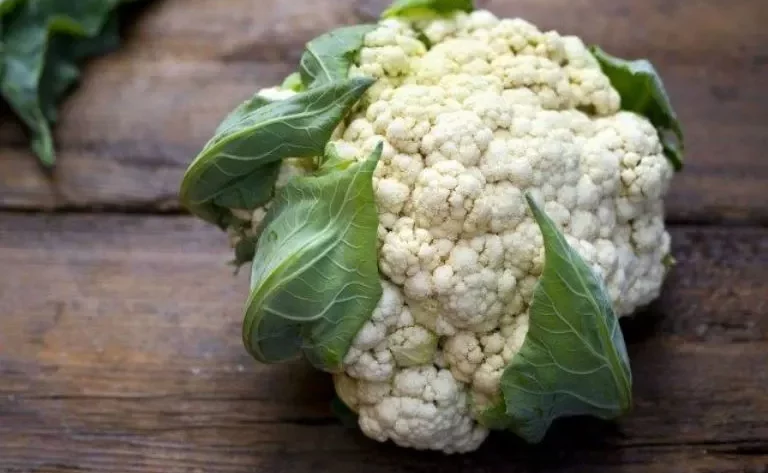Cauliflower is one of the most consumed foods In India, earlier cauliflower was available in some seasons, but now it is available around the year.
The Winter season is its peak season, you can also eat it raw and cooked. and many people love its pickle most.
It is an important vegetable grown all over the world. and widely used directly as vegetables, salads, and soups.
Brassica oleracea is the medical name of cauliflower.
The highest production of cauliflower is in China followed by India, USA, and Spain.
It occupies an area of 8.88 million hectares, having a production of 16.40 million tons in the world (1)
White cauliflower is the most common, however, there are other color types – Green (broccoli), purple, and orange.

Health Benefits of Cauliflower
Contents
Cauliflower has multiple health benefits such as:
Contain Many Nutrients
Brassica species like cabbage and cauliflower are rich in health-promoting phytochemicals, including phenolic compounds, vitamin C, and minerals (2)
| Fibre | Amount of nutrients |
| Protein | Fibre |
| Calories | 25 |
| Fiber | 2 g |
| Sodium | 20 Mg |
| Vitamin C | 100% daily recommended |
| Carbohydrates | 5 g |
| Dietary fiber | 2 g |
| Sugar | 2 g |
| Calcium and Iron | 2% of daily intake |
| Potassium | 6% of daily intake |
| Magnesium | More than 3% of daily |
100 grams of cauliflower in 1 serving contains 92 g of water, which helps you to keep hydrated.
Rich in Antioxidants Properties
Antioxidants are substances that control oxidation, or free radicals produced in our body.
Research suggests that cauliflower is a good source of natural antioxidants, which may help protect you from reactive oxygen species damage.
Antioxidants provide many health benefits to the body such as:
Good for skin include – Moisturization and brightening of the skin, reduction of fine lines and wrinkles, and taking off the inflammation.
Good for heart health – Antioxidants reduce the chance of getting a heart attack, by preventing blockage.
Cauliflower contains carotenoid and flavonoid antioxidants which have anti-cancer effects and may reduce the risk of chronic illness, diabetes, and other diseases (3) (4) (5) (6).
There are some foods that are high in antioxidants such as:
- Amla (Indian gooseberries)
- Vitamin C fruits like orange, guava, mango, watermelon, peaches, etc
- Green tea
- Walnuts
- Dalchini (cinnamon)
- Kidney beans
- Dark chocolate
Promote stomach health
Cauliflower is quite beneficial for those who have stomach acid issues.
Brassica vegetables may reduce sulfate-reducing bacteria (SRB) growth and therefore may be potentially beneficial to gastrointestinal health (7).
In addition, there are some foods that are excellent for stomach health which include:
- Cabbage
- Yogurt, and kimchi, which are rich in good bacteria.
- Sweet potato
- Polyphenol-rich foods like Berries, nuts, flax seeds, olives, dark chocolates, green vegetables, and olives.
- Add fruit juice to your diet
- Avoid alcohol, spicy food, junk, processed, and coffee.
Prevent From Cancer
Cancer is a group of cells involving abnormal cell growth with the potential to invade or spread to other parts of the body.
A 2014 research report and the National Cancer Institute show cruciferous vegetables have an anti-cancer compound called PEITC (8).
Cauliflower contains glucosinolates compound, which may help in preventing cancer (9), however, it may also help in:
- Help protect cells from DNA damage
- Prevent tumour blood vessel formation and tumour cell migration
- Has antimicrobial properties
- Ward off bacterial, and fungal infections from the intestines and other parts of the body (10)
- Indice cell death
Good in fibre
Cauliflower is good in fiber, which is quite beneficial for stomach health.
High dietary fibre, which promotes regular stool, especially works well when a person is in proper hydration.
In addition, the common cause of chronic constipation or regular constipation is a lack of fibre and lack of liquids in diet (11)
In addition, fibre has many other health effects such as:
- Maintain bowel health
- Lower risk of developing coronary heart disease, diabetes, and obesity (12).
- help in lowering cholesterol
- Improves glycemia and insulin sensitivity in non-diabetic and diabetic people.
- Lower blood pressure
- Help in weight loss
Apart from cauliflower, there are some other foods that you should add to your diet:
- Banana
- peaches and pears
- Apple
- Dried fruits
- Yogurt
- Beans
- Whole grains
- Broccoli
Check out – Unspecific 10 Reasons Why You Losing Weight
Has anti-inflammatory effect
Studies indicate that flavonoids have various clinical properties such as antiatherosclerotic, anti-inflammatory, antitumor, antiviral effects, etc (13) (14).
Cauliflower has flavonoids, and fresh cauliflower contains 267.21 mg/100 g, but the flavonoids are reduced after blanching and cooking.
Flavonoids have beneficial anti-inflammatory effects, which also protect our cells from oxidative damage that can cause disease.
Increasing evidence suggests that certain groups of fruits and vegetables, such as cruciferous vegetables ( Cabbage, cauliflower) may be beneficial (15) (16)
An anti-inflammatory diet improves the symptoms of arthritis, and lupus, and decreases the risk of obesity, cancer, heart disease, etc.
May Help In Weight loss
Cauliflower Diet was also popularised in 2016 as a weight-loss, by Radha Thomas in her book Diet by the same name.
According to Dr Bimal chhajer, which say that its 100 g contains 25 calories which are quite beneficial for weight reduction.
Good source of fibre, which slows digestion and promotes feelings of a full stomach, this reduces the amount of food intake, which is a vital part of weight control (17).
According to today’s Annals of Internal Medicine, show that eat 30 grams of fibre each day can help you lose weight, control BP, and Improve insulin response.
Research suggests that Fiber intake, energy density, and macronutrient composition may contribute to weight loss (18).
Check Out – Liquid Diet Recipes For Weight Loss: At Home,
Promote Bone Health
As we know cauliflower is rich in vitamin K.
If a person has Vitamin K deficiency in the body, which is allied with a higher chance of bone fracture, and osteoporosis.
Vitamin K is also good for blood clotting, which helps in healing wounds.
Its recommended amount for adults 19 years and older, vitamin K is 120 mcg daily for men 90 mcg for women and for pregnant or lactating (19).
Check Out – Ways To Maintain Your Bone Health – According To Research
Many other benefits
- Helps in iron absorption, which helps in Anemia
- Benefical in the respiratory system
- Brings shine in hair
- Help in muscle degeneration
- Good for brain health
You can believe that it is amazing food, you can eat it raw and cooked, but while cooked, avoid oil, or reduce the quantity.
Side Effects of Cauliflower
if a person has a thyroid disorder, then it is recommended that they should avoid Cruciferous vegetables or reduce their intake of them like
- cabbage
- bok choy
- cauliflower
- Brussels sprouts
- Kale
Because these foods block the thyroid’s ability to utilize iodine, which is important for normal thyroid
Also, it may interfere with the production of thyroid hormone if a person has an iodine deficiency.
Cauliflower is also a Goitrogenic food that may interact negatively with the normal function of the thyroid gland, so avoid raw eating.
NOTE: This food can be consumed but only if they are well roasted, and avoided raw.
Check Out – Best 6 Natural Ways To Treat Thyroid Disorder
Other side effects such as:
- Increase stomach gas
- Constipation
- may see diarrhea
BOTTOM LINE
Talk to your doctor if you see any discomfort, after eating Cruciferous-related foods, and it may also interfere with your medicine or medical condition.
Brassica oleracea is the medical name of cauliflower, and it goitrogenic food.




